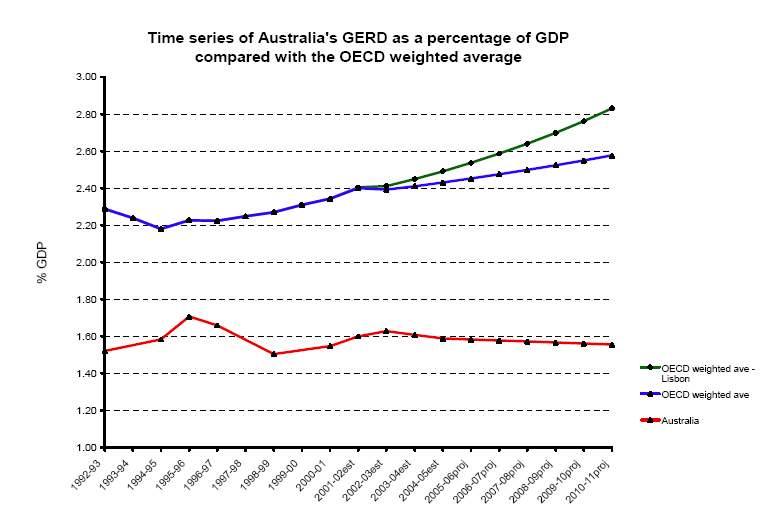|
News & Views item - July 2004 |
![]() The
Group of Eight Releases a Comparison of Australian and OECD Expenditure on R&D.
(July 13, 2004)
The
Group of Eight Releases a Comparison of Australian and OECD Expenditure on R&D.
(July 13, 2004)
With the release today by Britain's Chancellor Gordon Brown of the 2004 Spending Review and the "New Public Spending Plans 2004 - 2008" the Chair of the Group of Eight, Professor Ian Chubb let loose a broadside at Australia's Coalition Government for its continued strangulation of Australia's efforts to reach and then maintain parity with the OECD mean let alone the top quarter of OECD nations. In the statement released today Professor Chubb said:
In releasing the new spending program Chancellor Gordon Brown lamented the UK’s 1.9 % rate of gross expenditure on research and development (GERD) and aims to raise it to 2.5% by 2014.
Australia is languishing at 1.55%.
The average of all OECD countries is 1.81% GERD while the USA is 2.67%. Many nations have set up targets on science spending that look certain to relegate Australia to a second-tier research nation over the next few decades. The EU, for instance, outlined in its Lisbon Strategy that GERD should be raised to 3% by 2010 by member nations.
The Group of Eight has consistently raised the parlous state of Australia’s R&D investment and urged the government to adopt targets and introduce policies to stimulate business investment that will ensure we remain competitive with the US and European economies.
While Australian academics are highly regarded internationally, extra funding would enable them to further drive our institutions to the top of their academic fields. The higher the quality of our universities, the higher the impact they have on Australia’s economic and social prosperity and the greater the potential to develop new technologies and industry, providing a dramatic expansion of employment opportunities for Australians into the 21st century.
In support of his contention that Australia's efforts in research and development are being ringbarked by the Federal Coalition, Professor Chubb released the following chart which illustrates the breadth of the problem.

The chart predicts that despite the government’s science and innovation package announced in May this year, Australia’s overall investment on R&D, as a proportion of GDP, will stagnate over coming years and that as a result Australia will fall further behind the OECD weighted average for overall R&D expenditure.
The Group of Eight points out that the latest available data (OECD 2003-2) shows that the OECD as a whole invests 2.37 per cent of its GDP on R&D. In 2000-01 Australia invested 1.55 per cent, leaving a 0.82 per cent of GDP gap. This equated to a $5.5 billion a year shortfall compared to the OECD weighted average.
And they go on to say, "The OECD weighted average is the only GERD average reported by the OECD. It is based on the sum of all R&D expenditure by OECD countries divided by the sum of their GDPs.
"In March 2000, the Lisbon European Council defined the goal for the EU to become the ‘most competitive and dynamic knowledge-based economy in the world by 2010’. To achieve this goal, the EU15 members states have committed to increasing European investment in R&D to 3 per cent of GDP by 2010.
"The chart is based on official ABS statistics, our estimates for the years 2001-02 to 2004-05 and projections from 2005-06 to 2010-11. The projections are based on Australia’s average annual real growth rate for the five years to 2004-05 for GDP (3.5%) and GERD (3.12%)."
But one thing is certain, until the enormity of the problem and its effect on the nation's well being is understood by a voting majority of Australians, little besides copious quantities of spin will eventuate.